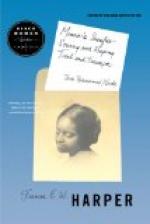“I do not call that poetry,” said one of the most intelligent women of A.P.
“Neither do I see anything remarkable about her,” said another.
“I did not,” said Mr. Thomas, “bring you the effusions of an acknowledged poet, but I think that the girl has fine ability, which needs encouragement and recognition.”
But his friends could not see it; they were very charry of their admiration, lest their judgment should be found at fault, and then it was so much easier to criticise than it was to heartily admire; and they knew it seemed safer to show their superior intelligence by dwelling on the defects, which would necessarily have an amount of crudeness in them than to look beneath the defects for the suggestions of beauty, strength and grace which Mr. Thomas saw in these unripe, but promising effusions. It seemed perfectly absurd with the surroundings of Tennis Court to expect anything grand or beautiful [to] develop in its midst; but with Annette, poetry was a passion born in her soul, and it was as natural for her to speak in tropes and figures as it was for others to talk in plain, common prose. Mr. Thomas called her “our inveterate poet,” and encouraged her, but the literary aspirants took scarcely any interest in the girl whom they left to struggle on as best she might. In her own home she was doomed to meet with lack of encouragement and appreciation from her relatives and grandmother’s friends. One day her aunt, Eliza Hanson, was spending the day with her mother, and Annette showed her some of her verses and said to her, “that is one of my best pieces.”
“Oh, you have a number of best pieces,” said her aunt, carelessly. “Can you cook a beefsteak?”




